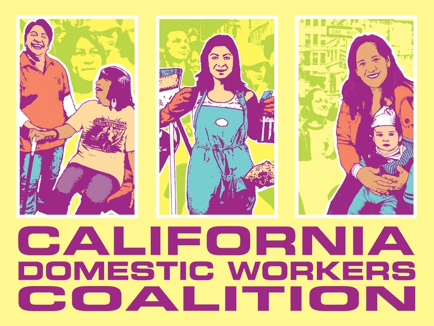KQED |
Domestic service workers and employers rallied in San Francisco and Los Angeles Thursday lambasting Gov. Gavin Newsom’s rejection of legislation aimed at preventing injuries and illnesses on the job over concerns that it would be too intrusive for households.
Some in the crowd of more than 100 near San Francisco City Hall held signs that read “Newsom: You are on the wrong side of history” and “I deserve a safe workplace.” Chants in Spanish of “Get out Newsom!” rose up periodically. A simultaneous demonstration in Los Angeles drew about 125 people, organizers said.
Protesters said they felt frustrated that the governor vetoed — for the second time — a measure to extend state occupational health and safety protections to an estimated 300,000 nannies, home-care aides and cleaners.
“We need a safe workplace just like other workers,” said Elizabeth Montiel, 60, adding that she endured a severe muscle injury from lifting heavy furniture and moving a washing machine while cleaning homes in San Francisco. “I am a domestic worker and I deserve respect. We deserve our dignity to be recognized.”
California’s labor law explicitly exempts household domestic service from its definition of “employment,” which historians attribute to a legacy of slavery and sexist policies impacting a workforce made up heavily of women of color.
Because of the legal exclusion, the California Division of Occupational Safety and Health (Cal/OSHA) does not have jurisdiction to issue citations on complaints involving this kind of labor, according to the agency.
Montiel and other workers said they’ve pushed for years for equal protections, including by traveling to Sacramento several times to rally and lobby lawmakers.
Newsom countered that rules meant for businesses would prove too onerous and potentially expensive for private households, particularly lower-income ones, which he said comprise 44% of the homes that employ domestic services.
In his Sept. 30 veto message (PDF), Newsom said SB 686 would make homeowners and renters subject to a “full set” of requirements, such as maintaining an Injury and Illness Prevention Program and providing an eyewash station to workers who use bleach and other chemicals.
“While I commend the author for the commitment to the well-being of workers in our state and share the spirit behind the legislation, new laws in this area must recognize that private households and families cannot be regulated in the exact same manner as traditional businesses,” Newsom said.
The governor also lamented that the measure did not identify which specific rules employers would be required to follow, or a particular system for enforcement.
But supporters pointed out that the bill allowed at least one year for Cal/OSHA to work out industry-specific standards compatible with groundbreaking voluntary guidelines for employers issued by the state last year.
Allowing domestic workers to be covered by safety protections was “a necessary first step to beginning this process,” said employers at the Hand in Hand network, which condemned the governor’s veto.
Oakland resident Jessica Lehman, who uses a wheelchair and employs home attendants to help her get out of bed and prepare meals, said Newsom’s statement was upsetting and “disingenuous.”
The 46-year-old believes that making the home workplace safer would also be a gain for people who live there, and help decrease labor shortages in the home-care industry by offering better jobs.
